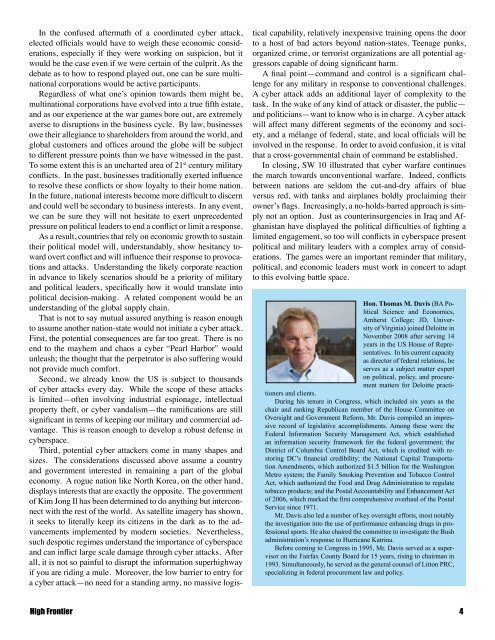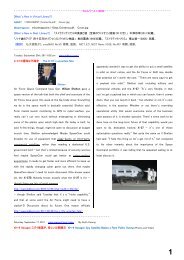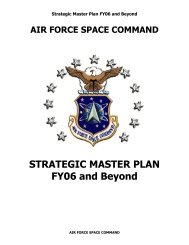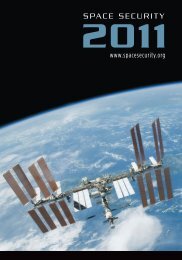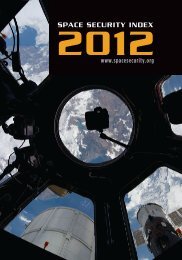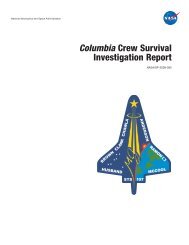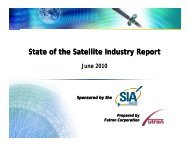Schriever Wargame 2010 - Air Force Space Command
Schriever Wargame 2010 - Air Force Space Command
Schriever Wargame 2010 - Air Force Space Command
Create successful ePaper yourself
Turn your PDF publications into a flip-book with our unique Google optimized e-Paper software.
In the confused aftermath of a coordinated cyber attack,<br />
elected officials would have to weigh these economic considerations,<br />
especially if they were working on suspicion, but it<br />
would be the case even if we were certain of the culprit. As the<br />
debate as to how to respond played out, one can be sure multinational<br />
corporations would be active participants.<br />
Regardless of what one’s opinion towards them might be,<br />
multinational corporations have evolved into a true fifth estate,<br />
and as our experience at the war games bore out, are extremely<br />
averse to disruptions in the business cycle. By law, businesses<br />
owe their allegiance to shareholders from around the world, and<br />
global customers and offices around the globe will be subject<br />
to different pressure points than we have witnessed in the past.<br />
To some extent this is an uncharted area of 21 st century military<br />
conflicts. In the past, businesses traditionally exerted influence<br />
to resolve these conflicts or show loyalty to their home nation.<br />
In the future, national interests become more difficult to discern<br />
and could well be secondary to business interests. In any event,<br />
we can be sure they will not hesitate to exert unprecedented<br />
pressure on political leaders to end a conflict or limit a response.<br />
As a result, countries that rely on economic growth to sustain<br />
their political model will, understandably, show hesitancy toward<br />
overt conflict and will influence their response to provocations<br />
and attacks. Understanding the likely corporate reaction<br />
in advance to likely scenarios should be a priority of military<br />
and political leaders, specifically how it would translate into<br />
political decision-making. A related component would be an<br />
understanding of the global supply chain.<br />
That is not to say mutual assured anything is reason enough<br />
to assume another nation-state would not initiate a cyber attack.<br />
First, the potential consequences are far too great. There is no<br />
end to the mayhem and chaos a cyber “Pearl Harbor” would<br />
unleash; the thought that the perpetrator is also suffering would<br />
not provide much comfort.<br />
Second, we already know the US is subject to thousands<br />
of cyber attacks every day. While the scope of these attacks<br />
is limited—often involving industrial espionage, intellectual<br />
property theft, or cyber vandalism—the ramifications are still<br />
significant in terms of keeping our military and commercial advantage.<br />
This is reason enough to develop a robust defense in<br />
cyberspace.<br />
Third, potential cyber attackers come in many shapes and<br />
sizes. The considerations discussed above assume a country<br />
and government interested in remaining a part of the global<br />
economy. A rogue nation like North Korea, on the other hand,<br />
displays interests that are exactly the opposite. The government<br />
of Kim Jong Il has been determined to do anything but interconnect<br />
with the rest of the world. As satellite imagery has shown,<br />
it seeks to literally keep its citizens in the dark as to the advancements<br />
implemented by modern societies. Nevertheless,<br />
such despotic regimes understand the importance of cyberspace<br />
and can inflict large scale damage through cyber attacks. After<br />
all, it is not so painful to disrupt the information superhighway<br />
if you are riding a mule. Moreover, the low barrier to entry for<br />
a cyber attack—no need for a standing army, no massive logistical<br />
capability, relatively inexpensive training opens the door<br />
to a host of bad actors beyond nation-states. Teenage punks,<br />
organized crime, or terrorist organizations are all potential aggressors<br />
capable of doing significant harm.<br />
A final point—command and control is a significant challenge<br />
for any military in response to conventional challenges.<br />
A cyber attack adds an additional layer of complexity to the<br />
task. In the wake of any kind of attack or disaster, the public—<br />
and politicians—want to know who is in charge. A cyber attack<br />
will affect many different segments of the economy and society,<br />
and a mélange of federal, state, and local officials will be<br />
involved in the response. In order to avoid confusion, it is vital<br />
that a cross-governmental chain of command be established.<br />
In closing, SW 10 illustrated that cyber warfare continues<br />
the march towards unconventional warfare. Indeed, conflicts<br />
between nations are seldom the cut-and-dry affairs of blue<br />
versus red, with tanks and airplanes boldly proclaiming their<br />
owner’s flags. Increasingly, a no-holds-barred approach is simply<br />
not an option. Just as counterinsurgencies in Iraq and Afghanistan<br />
have displayed the political difficulties of fighting a<br />
limited engagement, so too will conflicts in cyberspace present<br />
political and military leaders with a complex array of considerations.<br />
The games were an important reminder that military,<br />
political, and economic leaders must work in concert to adapt<br />
to this evolving battle space.<br />
Hon. Thomas M. Davis (BA Political<br />
Science and Economics,<br />
Amherst College; JD, University<br />
of Virginia) joined Deloitte in<br />
November 2008 after serving 14<br />
years in the US House of Representatives.<br />
In his current capacity<br />
as director of federal relations, he<br />
serves as a subject matter expert<br />
on political, policy, and procurement<br />
matters for Deloitte practitioners<br />
and clients.<br />
During his tenure in Congress, which included six years as the<br />
chair and ranking Republican member of the House Committee on<br />
Oversight and Government Reform, Mr. Davis compiled an impressive<br />
record of legislative accomplishments. Among these were the<br />
Federal Information Security Management Act, which established<br />
an information security framework for the federal government; the<br />
District of Columbia Control Board Act, which is credited with restoring<br />
DC’s financial credibility; the National Capital Transportation<br />
Amendments, which authorized $1.5 billion for the Washington<br />
Metro system; the Family Smoking Prevention and Tobacco Control<br />
Act, which authorized the Food and Drug Administration to regulate<br />
tobacco products; and the Postal Accountability and Enhancement Act<br />
of 2006, which marked the first comprehensive overhaul of the Postal<br />
Service since 1971.<br />
Mr. Davis also led a number of key oversight efforts, most notably<br />
the investigation into the use of performance enhancing drugs in professional<br />
sports. He also chaired the committee to investigate the Bush<br />
administration’s response to Hurricane Katrina.<br />
Before coming to Congress in 1995, Mr. Davis served as a supervisor<br />
on the Fairfax County Board for 15 years, rising to chairman in<br />
1993. Simultaneously, he served as the general counsel of Litton PRC,<br />
specializing in federal procurement law and policy.<br />
High Frontier 4


